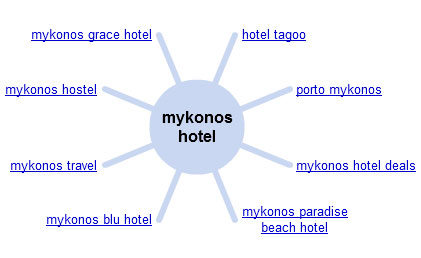How to create an effective keyword list
 Are you wondering what is the best way to create an effective keyword list? Following up a previous article “Keyword Research: The Core of your SEO Strategy», this week we will focus on a real world example, we will discuss the actual needs and we will put the theory into practice.
Are you wondering what is the best way to create an effective keyword list? Following up a previous article “Keyword Research: The Core of your SEO Strategy», this week we will focus on a real world example, we will discuss the actual needs and we will put the theory into practice.
The real world example
In this example we will decide which keywords we will use for the landing page of a luxury hotel suite. Our client owns a 5 Star hotel, located in Mykonos Island and the room type of the page is a suite for honeymooners. With that page we will try to attract high end profile visitors that match the hotel’s target audience.
Looking inside the visitor’s mind
The above short brief, along with the marketing research that we have previously conducted for the client, give some important pieces of information that help us understand the industry, the competition and the needs of the client. The next step is to come up with a list of keywords that describes the product of our client and that includes search terms that are more likely to be used by users. Thus on this step we will pretend to be a potential client and we will start by typing queries on the major search engines in order to find some related keywords and results.
Analyzing Search Engine Results
First of all, let’s assume that the potential visitor has already decided the destination (Mykonos) and the desired type of accommodation (suite). After typing some queries, the searcher starts refining search queries for more targeted terms such as Mykonos hotel suites, honeymoon hotels etc. Especially if Google instant is on, the searcher will receive suggestions and as a result he/she will refine the queries much faster and easier.

Using Google Search during Keyword Research is a must because Google Suggest, Google Instant and Google Wonder Wheel can help you find easily relevant and popular terms. Nevertheless there are several other great sources of information that you can use. For example if the website has already a page for honeymoon suites, you can also retrieve keywords from the Web Analytics Reports. Even better, if there is a PPC campaign targeting on honeymoon it is a great opportunity to gain useful insights from the actual searchers.

Selecting the targeted keywords
After brainstorming and gathering a large list of keywords from various sources, we need to refine it and keep the most important terms. We mainly try to keep the keywords that describe better our page and that are more likely to be used by our users. In this example we decided to use the following as our main keywords:
- Honeymoon
- Hotel
- Suite
- Mykonos
- Greece
Note that there are tones of other single-word keywords that you can use (such as couples, romantic, luxury, destination, etc) but it’s up to you to decide on which you will focus. Your selection should be based on the project type, the competition, the website strength etc.
After selecting our main terms, we create a list of more targeted keywords. Those keywords will drive to our website more targeted traffic and usually they are easier bring higher rankings comparing to the generic terms. For example the most important keywords of our list can be:
- Mykonos Honeymoon Suites
- Hotel for honeymoon
- Honeymoon Hotels Mykonos
- Mykonos Luxury Hotel Suites
Again there are lots of alternatives that you can select. It’s up to you to decide what is more relevant to your page, which terms are likely to bring more traffic, for which terms you are more likely to rank high etc.
Note that you can evaluate the popularity of each keyword, estimate the monthly incoming traffic and get some extra ideas by using Google Adwords Keyword Tool.

After refining the set of keywords, make sure to study AGAIN all the available marketing info, and, if possible, brainstorm with client representatives or a marketing department in order to be sure that your mindset is aligned to the branding and positioning lines.
Optimizing the content of your page
When you want to optimize a website, focus on each page separately and do a research and brainstorm for keywords connected to the needs of a hypothetical searcher. Always have in mind that each page’s content should reflect answers to user’s needs and therefore requires a dedicated and unique approach. Don’t forget that you should focus on keywords for which you are more likely to achieve higher rankings. You can learn more on how to analyze the competition on SERPs by reading the article “Improve your website traffic by analyzing the SEO of your competitors”.
Last but not least after finalizing the list of keywords, you need to write the texts and optimize the SEO copy of your page. You can learn more about on-page optimization by reading the articles “How to optimize page Titles and improve click through rates”, “5 quick white-hat tips to boost your SEO Rankings” and “The 5 basic rules of SEO copywriting”.

 16 Comments
16 Comments


